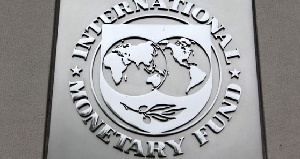 Annalisa Fedelino led a team to conduct the seventh review of Ghana
Annalisa Fedelino led a team to conduct the seventh review of Ghana
The International Monetary Fund (IMF) has said Ghana’s growth prospects remain strong.
The verdict by the IMF follows a team visit by its staff to Ghana led by Annalisa Fedelino, from 17–27 September 2018, to conduct the seventh review of Ghana’s economic programme supported by the Extended Credit Facility (ECF).
The discussions focused on recent developments, fiscal and monetary policies, and programme implementation.
At the end of the mission, Ms. Fedelino said: “Growth prospects remain strong, supported by robust oil and cocoa production. Inflation has remained in single-digits. S&P upgraded Ghana’s ratings from B- to B with a stable outlook in September 2018. The government continues to step up efforts to address financial sector vulnerabilities, with the recent purchase and assumption of five banks. However, Ghana has been affected by the volatile environment for emerging and frontiers markets, which has exerted pressure on the currency resulting in cedi depreciation”.
Read the full IMF statement below:
IMF Staff Completes Seventh ECF Review Visit to Ghana
End-of-Mission press releases include statements of IMF staff teams that convey preliminary findings after a visit to a country. The views expressed in this statement are those of the IMF staff and do not necessarily represent the views of the IMF’s Executive Board.
• Achieving end-December fiscal targets hinges on strengthening both expenditure discipline and tax compliance, beyond measures adopted in the mid-year budget review.
• Continued prudence on the monetary policy easing cycle is welcome and inflation is expected to remain within the target bands until the end of the year.
• The government continues to step up efforts to address financial sector vulnerabilities.
An IMF team led by Annalisa Fedelino, visited Accra from September 17-27, 2018, to conduct the seventh review of Ghana’s economic program supported by the Extended Credit Facility (ECF). The discussions focused on recent developments, fiscal and monetary policies, and program implementation.
At the end of the mission, Ms. Fedelino released the following statement:
“Growth prospects remain strong, supported by robust oil and cocoa production. Inflation has remained in single-digits. S&P upgraded Ghana’s ratings from B- to B with a stable outlook in September 2018. The government continues to step up efforts to address financial sector vulnerabilities, with the recent purchase and assumption of five banks. However, Ghana has been affected by the volatile environment for emerging and frontiers markets, which has exerted pressure on the currency resulting in cedi depreciation.
“Programme performance has been affected by external and domestic factors. Available fiscal data through end-July point to much expenditure front-loading on goods and services and lower-than-programmed revenue, especially VAT and import duty. On this basis, achieving end-December fiscal targets hinges on strengthening both expenditure discipline and tax compliance, beyond measures adopted in the mid-year budget review. The authorities remain strongly committed to the program targets. The 2019 budget would need to address persistent revenue shortfalls and start tackling decisively the issue of exemptions. Continued progress on fiscal structural reforms—particularly on public financial management and oversight over state-owned enterprises—is instrumental to anchor expenditure control and lasting fiscal discipline. Access to new financing arrangements and longer-term debt instruments would help fund Ghana’s pressing development and infrastructure needs; such arrangements would need to be implemented transparently, deliver value for money, and be consistent with debt sustainability considerations.
“Continued prudence on the monetary policy easing cycle is welcome and inflation is expected to remain within the target bands until the end of the year. Recent exchange rate pressures reinforce the call for fiscal discipline. Going forward, improved communication and coordination would help foster deeper and more liquid FX market.
“Recent bank resolutions underscore the authorities’ commitment to financial stability and will help improve medium-term prospects for economic growth. While costly for Ghanaians taxpayers, they are nonetheless necessary to address long-standing weaknesses and create a resilient financial system, improved access to credit and financial inclusion. The overall financial system is adequately capitalized, but weaknesses in some institutions—including high levels of nonperforming loans—can adversely impact financial stability, hamper credit growth and investment, and create contingent liabilities for the government. The Bank of Ghana (BoG) is introducing reform measures to address remaining financial sector weaknesses with the view of improving the availability and affordability of credit to the private sector.
“The mission met with Vice-President Mahamudu Bawumia; Finance Minister Ken Ofori-Atta; Deputy Ministers’ Charles Adu Boahen; Kwaku Kwarteng; and Abena Osei Asare; Governor Addison of the BoG as well as First and Second Deputy Governors Maxwell Opoku-Afari and Elsie Addo Awadzi; and other senior officials. The IMF team is grateful to the authorities for constructive discussions and collaboration.
Discussions will continue in Washington DC, including on the impact of the rebased GDP to be soon released; and on the 2019 budget and reforms in the pipeline.”
IMF Communications Department
MEDIA RELATIONS
PRESS OFFICER: LUCIE MBOTO FOUDA